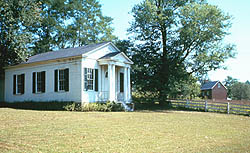 From here.
From here.Fairfax Circuit Court Judge Randy I. Bellows on Friday issued a fourth straight ruling in favor of a group of 11 conservative Episcopal churches that left the denomination two years ago this month — dismayed over issues of biblical authority and the prospect of gay clergy.
The Episcopal Diocese of Virginia immediately said it would appeal the huge multiproperty lawsuit, the largest in the history of the Episcopal Church. The conservatives took millions of dollars of historic property in Northern Virginia with them when they left.
The judge dismissed a last-ditch effort by the diocese to keep the property when it claimed in September that part of the historic Falls Church in Falls Church city is actually owned by Christ Episcopal Church in Alexandria.
The judge seemed incredulous that the diocese would make such a claim, which, he said, contradicted the testimony of one of the experts — church historian Edward L. Bond — who appeared on the stand on behalf of the organization.
"Alexandria's ownership of this property is an 11th-hour revision in theory made 17 months into this litigation, which was designed to fit into the narrowing window left by this court's multiple letter opinions," the judge wrote.
The diocese and the Episcopal Church's "claims regarding Christ Church, Alexandria's interest in this property are wholly at odds with the historical record, with numerous court orders and petitions over the past century and a half, with the land records of Fairfax and Arlington counties and with the Episcopal Church's and diocese's own repeated assertions and admissions recognizing the Falls Church as the legal owner of this 2-acre parcel," he added.
As far back as 1851, circuit courts in Arlington and Fairfax County had always recognized the land as belonging to the Falls Church, he said, and the diocese had never objected to that finding until four months ago.
"To dismiss more than 150 years of such documentation as some huge misunderstanding is just not persuasive," the judge said.
The diocese received a possible prize in the ruling: an endowment fund of less than $1 million owned by the Falls Church that did not convey along with other property when the church — once attended by George Washington — left the denomination. The judge will rule on that separately.
Still, Friday's ruling was not the outcome expected by the Episcopal Church and the Diocese of Virginia when they sued the 11 congregations nearly two years ago. The churches left the denomination over issues of biblical authority and the 2003 consecration of an openly gay Episcopal bishop. They formed their own group, the Anglican Diocese of Virginia (ADV).
Although dozens of other Episcopal congregations across the country have left the denomination, few have managed to hold onto their property. However, the 11 congregations benefited from an unusual clause in the state constitution known as the "division statute." Created in 1867 for denominations split over the Civil War, it allows the majority of the members of a congregation to leave while still retaining church property.
Virginia is the only state in the country with such a statute. The diocese announced that the appeal will go to the Virginia Supreme Court "shortly."
"We continue to believe the division statute is a violation of the United States and Virginia constitutions because it intrudes into the freedom of the Episcopal Church and other hierarchical churches to organize and govern themselves, said Virginia Bishop Peter James Lee. "Within the Episcopal Church, we may have theological disagreements, but those disagreements are ours to resolve according to the rules of our own governance."
The diocese realized over the summer that it was losing the mammoth lawsuit and first announced Sept. 22 that it would appeal the case. The diocese announced Friday that it has retained A.E. Howard, a constitutional scholar with the University of Virginia's law school, to argue the case before the state Supreme Court.
The diocese took out a $2 million line of credit in January to fight the case, but its spokesman, Henry Burt, would not say Friday what it has spent.
Jim Oakes, vice chairman of the ADV, said his side was pleased with the judge's ruling. He said conservatives have spent close to $2.5 million on the trial. All their legal bills, he added, will be paid by the end of 2008.
"There are many godly people left in the diocese," he said, "and I'd hope someone would hold the leadership to account on how much they've spent and why they are continuing to spend it, when we had said all along we wanted to negotiate with them. They would have gotten some money from us — which would not have been a trivial sum — had they gone that route."
As for the ruling, "The judge ruled to uphold the constitutionality of the Virginia division statute against all of the free exercise, establishment, equal protection and takings clause challenges raised by the Episcopal Church and Diocese of Virginia," he said.
"The Episcopal Church and [the] diocese had no legal right to our property," he added. "We have maintained all along that our churches' own trustees hold title for the benefit of these congregations."

1 comment:
Man, Julia Duin is an idiot. Misquoting the judge. Saying that the "division statute" is a part of the state constitution. Sheesh.
Post a Comment